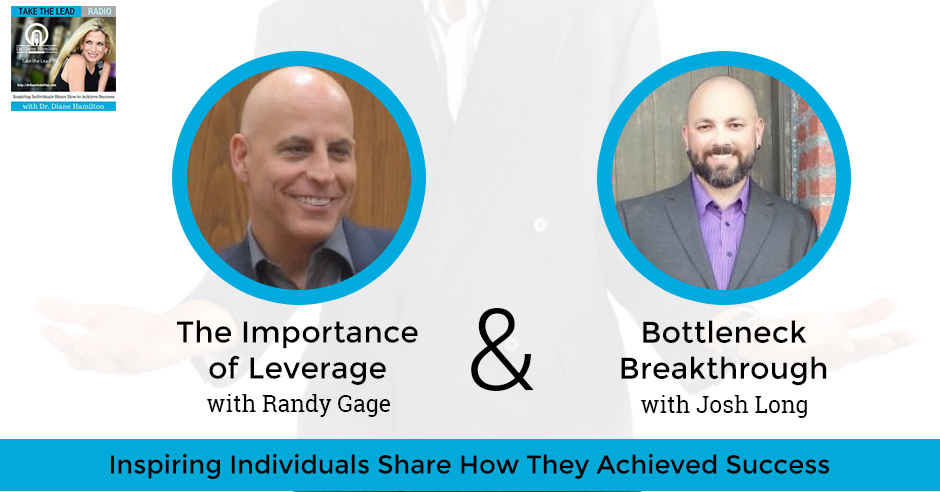
We have Randy Gage and Josh Long. Randy is a New York Times bestselling author of multiple books including Mad Genius and Risky Is The New Safe. He’s also a Hall of Fame Speaker. Josh is a coach/consultant at Bottleneck Breakthrough Group and he’s an author. We’re going to talk to both of these guys about their books, about their speaking, consulting and everything else they’re doing.
Listen to the podcast here
The Importance of Leverage with Randy Gage
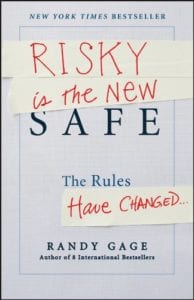
Risky is the New Safe: The Rules Have Changed . . .
I am here with Randy Gage who is a thought-provoking critical thinker who will make you approach your business and your life in a whole new way. He is the author of ten books translated into 25 languages including the New York Times bestseller Risky Is The New Safe and Mad Genius. It’s nice to have you on the show, Randy. Thank you for joining me.
Thanks. It’s great to be on.
I love watching your talks. I like to watch what people do before I have them on the show. I could see why you’re successful. The biggest thing that I wish I could do that you do well is you can tell a story and keep people on the edge of their seat. No wonder you’re in the Speaker Hall of Fame. How did you learn to do that? You have an interesting childhood background that led to all this. If anyone hasn’t seen your work, which I would find that hard to believe, but in case they haven’t, can you give a little background.
I was in jail for armed robbery at fifteen. I was a teenage drug addict, a teenage alcoholic, expelled from high school. I certainly had some adventurous childhood days. I was a poor guy. My mom is a single mother who raised three kids by herself. I was the middle one and caused her the most grief in her life. I have been able to turn it around and I have had a wonderful life since then but that’s the formative years. As far as your storytelling thing, I was fortunate to meet a guy named Bill Gove who was the first President of the National Speakers Association. He was one of those motivational speakers back in the day in the ‘70s when there wasn’t a lot of them. He was like my adopted grandfather. We met at a speakers’ event and we loved each other. He was a great mentor to me and he always thought, “If you give audience 27 things they need to do, they’re not going to remember 25 of them.” If you want people to implement stuff, tell a story and make a point and then they remember the story, so they remember the point. I apply that if I’m writing a blog post, if I’m writing a book, creating an audio album. I’m doing a keynote speech. I’m always looking for, “What’s the story that I can tell here that demonstrates this point to the reader or listener or viewer?”
You do a great job of it. I’ve have had maybe sixteen Hall of Fame Speakers on my show from Tom Hopkins, who was one of the first from that time frame and so many others. They’ve all been fascinating. You guys are all great at telling stories. A lot of people could benefit from that. One of the stories you told about not giving up, you told about having the right to quit and something you had done on your direct selling daily on Facebook. Do you remember that story about having seventeen people you had called to sign up to go to your event? Give a background on that story because many people give up and don’t know when to give up. How come you didn’t give up?
That was many years ago. I joined the Amway Corporation. Those days if you joined Amway, they give you a three-inch thick binder and then you called people, “Hello, friend’s name here. This is your name here. I’ve got something I’m excited about and I would like to share with you. What would be good? Tuesday at 7:30 or Thursday at 7:00?” I’m this twenty-year-old kid and I’m making these calls. I’d never heard of Amway, direct selling, network marketing, nothing. I thought I discovered a secret to the universe. I’m calling all these people. They’re hanging up the phone. They’re ridiculing me whatever, but I get seventeen people. I keep calling because they told me that was going to happen. I’ve got seventeen people who were going to come and nobody shows up and I have this secret meeting. I should have quit. If that happened to 100 people, 99 out of 100 would quit. The choice that I made at that time was I am the most ambitious person I know and I’m going to build on that. That was the choice. I was a minimum wage dishwasher in The Pancake House. It’s how I started out, being thrown out of school and everything.
[bctt tweet=”Find something you want to do. Life is way too short to be spending a third of it doing something you hate.” username=””]It’s not like I had a bunch of companies trying to recruit me and give me a corner office with a BMW. My friends were other cooks and waiters and bartenders. We all smoked. We all drank. We all went out and partied all night. That was the consciousness of me. It was the consciousness of my circle of influence. When I saw that Amway presentation, the thing I got was leverage. I didn’t stay with Amway. I left and quit eventually but they seem to have squeaked by without me since they did $10 billion or something like that. It’s a great company, great opportunity, it wasn’t me at that moment in time. They introduced me to this concept of leveraging. I was probably the first person in my family, we could trace it back to whoever was the original descendant on the Mayflower and none of them ever did anything except trade hours for currency. Nobody had ever practiced leverage and that’s what I learned from that. I said, “I’m the most ambitious person I know. I’ve got a bunch of friends and they’d rather sit home and watch TV and go out drinking. I’ve been doing that all my life and I want to change something.” I built on that and that’s where I planted my flag.
I’ve studied much about curiosity and what makes people successful and what keeps people from being curious. You continued to fight, to not be a victim. You could have printed the best victim resume to top anyone’s story. Everybody’s like, “You think that’s bad. This is what I had,” and it reminded me of that Monty Python routine where the one guy says he had it so bad he had to live in a hole in the ground. The other guy comes back with, “We were evicted from our hole in the ground. We had to go live in a lake,” and it goes on and on. There are many people that can do that. You can talk next guy. How do you get past that thinking so that you’re not a victim anymore and you become the most ambitious person and believe that?
It starts with your programming, what you allow yourself to be programmed with because we are all being programmed 24 hours a day, seven days a week in CNN and Fox News and MSNBC. On Facebook and Twitter and YouTube and all the subliminal messages and all the shows we watch. The things we listen to, the organized religion, the government, this whole data scare of all the information around us. In the analogies from As A Man Thinketh, in the garden, you could let the wind blow in seed and then you get weeds of whatever or you cultivate the garden and decide what you want to plant there. You have to become the thinker of the thought and be mindful about what you think about. Be mindful about what you allow to program you, the books you read, the TV shows you watch, the people you hang with. That has this cumulative effect that keeps building because the programming determines your vision of what you think will happen with your life. Everybody has a vision. A lot of people say, “That’s my problem, I don’t have a vision.” You do. You either have a positive empowering vision, a neutral vision which is, “Get through the week and keep your head down. Friday, you can get Pizza Hut and Netflix and binge all weekend.”

Bottleneck: We are all being programmed 24 hours a day, 7 days a week.
There are people with a negative vision that expect bad things to happen. They expect to lose, expect people to rob them, expect people to reject them. That’s determined by your programming. You have these core foundational beliefs that are founded and then the core foundational beliefs create this vision and then that’s what determines your daily action. Whether you go after it and decide to write that opera or take that company public or write the great American novel or propose to the love of your life. You could reverse engineer it and go back to the programming because at the ultimate level, the question we always get to is, “Do I want to be a victim or do I want to be a victor?” There’s no in between. You have to pick one. For the first 30 years of my life, I was a professional victim. I hung around with other victim friends and did the whole commiseration thing and everybody’s trying to out-victim everybody else. At some point, it becomes your life or you make a conscious choice and you say, “I’m not willing to be a victim anymore. I’m going to become a victor.”
Part of what I do with companies is to help them recognize this. What you call programming, I call environment. It’s the factors around you that impact how you think and you don’t even recognize it because it’s what you’ve always known. Recognizing it’s the hugest thing to me is pointing out, “This is why we think this way,” and I don’t think people stop to think that way. Your talk that I saw was Inspire Change in Life and you talk about how dreams get paid for and if they have a cost. Sometimes people want things given to them. How do you get out of that mindset to know you’ve got to pay for whatever it is that you have to do?
That’s the victim thing. You’re still being the, “It sounds like you need that money. I need the money. I want to start a homeless shelter for orphaned llamas. I only need $4 million to do that. You’re rich. You don’t need that money.” It’s all victim entitlement mentality. You’ve got to make that choice. I wrote an entire book about mind viruses. Its title gets in people’s face. It’s called Why You’re Dumb, Sick and Broke… And How to Get Smart, Healthy and Rich!. In the whole book, I’m breaking down the means or the mind viruses we get from organized religion, the mind viruses we get from the government, the mind viruses we get from the data scare. The thing that shocks most people when they read that book the first time is I can demonstrate on a saleable logic why your core foundational beliefs on the most important subjects, meaning money, religion, sex, relationships, health, happiness are usually determined before you’re eight years old. It’s your mother and father fighting all the time and she’s cheating on him or he’s abusing abuse her. Your core foundational belief about relationships and marriage, that’s set when you’re six, “Do you think money is growing on trees? We may not be rich but at least we’re poor.” Your core foundational belief that money is bad and rich people are evil, that’s set six, seven, eight years old. People say, “You’re telling me that I’m self-sabotaging my career at 45 years old from a belief that I developed when I was seven?” That’s exactly what I’m telling them.
Until you read that book or you will follow my YouTube channel, I have a podcast that I’m also doing like you. Mine’s called Power Prosperity Podcast. You get exposed to something like that and I make a statement like that or that you are reading this blog and you’re like, “Do I have a self-conscious belief that money is bad? Is that the programming that I got from my parents when I was five, six, seven years old?” When you recognize that, your whole world changes because then you realize, “I probably am sabotaging my marriage because of a model that I learned from my parents or my grandparents when I was eight. I never went back and questioned the premise and questioned the belief and said, ‘What is my core foundational belief about God/religion? Core foundational belief about marriage/relationships? About money? About sex? About health? About happiness?’” If you don’t do that then you’re still the prisoner to the mind virus and your life is the victim mode. If you’re willing to do the work and willing to do the introspection and question that and say, “Really?” Then you say, “Does that belief serve me?” and if it doesn’t, you drop it like you would an ill-fitting jacket. You take it off, you leave it behind and you replace it with a new jacket that fits you better. In this case, a new belief that empowers you instead of disables you.
[bctt tweet=”Be mindful about what you think about.” username=””]You made many great points there and a lot of it ties into a belief about money and you talked about using leverage. We would get paid and you would never think about doing anything other than working for the man or whatever. What did you learn about the importance of leverage? What do you mean by using leverage for people who are reading that don’t know what you mean by that?
If you look at the greatest wealth of our generation, Zuckerberg, Gates, Jobs, those people, and the generation before that, if you go and read Think And Grow Rich, Napoleon Hill says, “Ford and Carnegie and Firestone and Edison. What is the one commonality of all these wealthy people who created wealth, not inherited it but who created it?” They have to use leverage because Mark Zuckerberg does not trade hours or dollars. He has superseded that because he’s put leverage. He has this Facebook platform which allows him to reach three billion people and every time they click on an ad for cat food, he made $0.02. Whether it’s Lady Gaga creating her new album or JK Rowling’s writing her next book, they practice leverage. She writes that book once, but five million people buy it. Gaga does her song but two million people download it. She doesn’t have to sing that song again every time for each one of those two million people. She recorded it and they downloaded it. She has exited from the reality of having to trade hours for currency. To me, leverage is like compound interest. It’s one of the great wonders of the world.
You’re talking more of a passive income setting where you create something and then it pays back later where you’re not having to do it over and over again. How do people know what that is that they can do? I do my work with curiosity assessments and things and other people are giving the assessment and then I do not have to do it every time somebody else is doing it. How do people know what their curiosity assessment is or what their speech that you’ve created as a webinar that keeps getting downloaded or whatever it is that you do? How do you know what they would be good at?
Go with something you like, you want to do and that you have a passion for because if programming code is a hot job that bores you to tears, that isn’t something you’re going to want to do. Find something you want to do. Life is way too short to be spending a third of it doing something you hate and then you look for models. There are three models I love. I love direct selling. Companies like Amway or Herbalife or Fusion or Nu Skin or whatever. Where you’re going to introduce people to the business, they’re going to build a customer base. They’ll introduce other people who build the customer base. You get a residual income on it. That’s leverage. Real estate is another one. You don’t need $100,000 to buy a $100,000 house, you need $10,000 and you can buy a $100,000 house. If you’re willing to do the work and learn how real estate works and learn how to evaluate a neighborhood and how property values are going to go up or property values are going to go down, you can apply leverage. The other way that I do it is an information entrepreneur, which is what you do. We create IP, intellectual property and then we sell it through video seminars, workshops, webinars, coaching programs, consulting programs.

Bottleneck: Your core foundational beliefs are usually determined before you’re eight years old.
I have systems and processes that help people undercover their negative programming, how to replace it with a positive program. They could join my coaching program. They could read one of my books. They could buy one of my audio albums. I don’t have to personally drive over to their house and spend an hour and a half with them explaining something. They can watch it on a video. Those are three models that are great avenues for somebody to practice leverage. If you are the information entrepreneur one and the direct selling one, you have a lot of latitudes. If your passion is health and wellness, you could join a direct selling company that has wellness products and be right in your lane. You can become an information entrepreneur and become a personal trainer. Do Instagram and Facebook and offer coaching, consulting and develop products along with them. If you’re an expert on etiquette, you can teach etiquette courses and write etiquette books. If your passion is taking care of animals and working with veterinarians, you can develop information IP for veterinarians on how to better take care of their patients, run their practice better and help more animals. There are all kinds of latitude there. Find something that lights you up.
You’ve got your podcast. You’ve got your Prosperity TV. You’ve got all kinds of things. This show’s nationally syndicated. It’s on AM/FM. I have a different route than some people. Some people just have a podcast. Some people just have a blog. It takes a long time to be able to monetize some of these things. Are there any quick tips to doing it any faster? It takes a while to build your platform.
If I look at my case, I do it different ways and different mediums. You’re going to do depending on where you’re at in your career and what you need, “I want to build my brand more and get out there more. I’m going to put more free content. I need money to pay the rent. I’ve got to monetize something sooner.” Everybody has a different space on that spectrum and they’re going to choose what’s right for them. My podcast, I don’t have sponsors. I decided, “I’m going to do the podcast and I’m going to give it away for free. People are going to listen to it. If they like my stuff they’re probably going to say, ‘All this for free, I should probably buy his book and see what he says in there or maybe I’m going to take his master class on this or his online learning platform on that.’” Gary Vee does a great job of this. He’s a perfect example. Most people are going to be able to duplicate him because he’s got a staff of twenty people who follow him around all day, record everything he says and then turn it into content. You can model the principle which is, “I’m going to give all kinds of content for free. I’m going to position myself as the definitive, go-to resource in my space.”
If you’re a real estate agent and you did a Facebook Live stream every Friday afternoon at 1:00, “Here we are in Nashville, Tennessee. This week we’re going to talk about how our property values in Nashville are working. Are they going up? Are they going down? Next Friday, we’re going to talk about how you get the best mortgage rates when you’re applying for a mortgage.” You do that every Friday at 1:00 you’re doing your show. Free content, give it away. The people watching that, they are not in the market for a house. They’re not buying, they’re not selling but they see you and they perceive you as an expert. One month from now, one year from now, five years from now they decide, “It’s time we got our first starter home. I’ve been watching that person on Facebook every Friday. He’s an expert on that. Let’s call him and hire him to help us find our house.” That works. You do position yourself as the go-to expert and then people will spend money with you. It’s that simple. You’ve got to create a product and you’ve got to sell it, but you still can do the same thing. You can give away tons of free content that will cause people to buy that first product.
[bctt tweet=”Leverage is like compound interest. It’s one of the great wonders of the world.” username=””]We could go back to that original story where you said you invited the seventeen people and no one shows up. There are going to be disappointments at the beginning and you have to be tenacious. You can’t give up. Having come from generations of salespeople in my family, we were taught not to give up. A lot of people have a hard time with that. What you teach is important. I love watching your talks. I could see why you’ve spoken with two million people in 50 countries and all the stuff that you’ve done. You do deserve all the attention you get because you are a great speaker. I loved watching your videos and I know I’ve had probably fifteen or more. I don’t even know of the Hall of Fame Speakers and every time I have one of you guys on the show, you’re always inspirational. I was glad that you joined me, Randy. A lot of people want to know how they can find out more. Is there some website you’d like to share?
My site is RandyGage.com. You can link off to the Facebook, YouTube, Twitter. I’m on all the social media. You could find me easy. The books are on Amazon. The podcast is called the Power Prosperity Podcast. I’m in all the major platforms so I’m easy to find.
Thank you, Randy. This has been so much fun. I appreciate it.
Thanks for having me on. What a great show.
You’re welcome.
Bottleneck Breakthrough with Josh Long
I am here with Josh Long who is a consultant and coach. He combines them and calls himself a coachsultant with Bottleneck Breakthrough Group. He helps B2B businesses find the single biggest challenge stopping their business from growing and he helps them fix it in 90 days. He says he helps people fix problems they don’t even know they have. Welcome, Josh.
Thanks, Diane. It’s great to be here.
I’m interested in what you’re doing because I was looking at some of this stuff on different sites and some of your talks and different things that you’ve done. You’ve worked with Jay Abraham, Chet Holmes. Also Mitch Russo, you worked with him.
Mitch was my boss. We talked daily for a couple of years.

Bottleneck: There are different ways and different mediums you’re going to do depending on where you’re at in your career.
Mitch has been on the show. I know Mitch pretty well, he’s great. Dan Kennedy, Perry Marshall‘s been on my show. It’s a who’s who list. I’m interested in what you do because you say that people have problems they don’t even know they have. What are those problems?
It comes down to what revenue plateau they’re at for most businesses. There’s an occasional business that has outsized revenue from less staff or whatever. For the typical business, they start running into their first bottleneck right around $1 million in revenue. The thing that I found is many business owners have to be resourceful because few of them are venture funded. They’re all bootstrapped. There’s one person in every position on the org chart doing everything. They become self-reliant and resourceful. As the company grows and they get some staff, the staff becomes an extension of their arms. I’m going to date myself but they get Go Go Gadget arms. There’s something longer to wrap their capabilities around but inevitably read around $1 million those arms are not long enough and they don’t know what to do. Their staff is capable but often the business owner says, “If I could find a mini-me, I need a mini-me to delegate to, to put it off to or whatever,” and the problem is there are no mini-mes of entrepreneurs there. If there were, they’re off starting their own business. It’s understanding of personality types and stuff. The reality is that right around $1 million they’ve got to develop an operations manager. Somebody they can divide the company into where the owner is the rainmaker and the operations manager is making sure that all the rain is being caught.
Everybody’s being dealt with and fulfilled. A friend of mine coined the term, he says, “You need a little Napoleon back at the office cracking the whip,” and I thought that defined it well. If the owner doesn’t get that that operational support offloaded, they end up throttling themselves because they are a great rainmaker most often. They’ve gotten the business to this $1 million, $1.5-million mark. They know how to close more business, but they know that if they close more, they’re going to have to manage the fulfillment more, which they don’t want to do. They don’t find enjoyment in it. They throttle themselves and then they get stuck. That’s the first major bottleneck that most business owners hit. If they don’t naturally figure it out, they’re not that top 5% or 10% of business owners that sails through challenges. They don’t know what they don’t know. They don’t know that they need to create an organizational chart and then develop that responsibility and those lines of command.
[bctt tweet=”Focus on solving a bottleneck, and go from one key bottleneck to the next.” username=””]How do you determine the best operations manager? If you don’t need you, who do you need and how do you determine the right person?
Oftentimes, you can promote from within because you’ve got people doing stuff and there’s usually a person that has some inclination to take that on. The other thing is if that team is not capable and there’s nobody that’s ready to step up to the challenge, the biggest concern that I get from business owners is, “I can’t go higher $60,000 or $70,000.” Your operations manager comes in. The underlying statement is, “I’m comfortable with my quality of life and my finances where they’re at. I don’t want to dig into my own pocket to bring somebody on.” The beauty is you can ease your way into that role. You don’t have to go hire a full-fledged COO to come into this million-dollar company. You get a player-coach operations manager using a sports term, somebody that is able to do the work but also manages the team. Start taking over that responsibility and grow more into that so that you’re easing them into it without taking off a huge management salary all at once. I rely a lot on personality tests.
Which ones?
I like the one called Innermetrix. It incorporates the DISC. It has what they call a values profile and then the third part, your natural abilities of intelligence and self-awareness and stuff. Myers-Briggs is great. Kolbe is great. Innermetrix says that DISC is part of it. At the end of the day, I like the tool that gets used.
I wrote a book on personality assessments because I wrote my dissertation on emotional intelligence. I’m certified to give the EQi, DISC, Myers-Briggs and different tests. I find that’s all fascinating and I wrote an assessment about curiosity and how to measure the things that keep people from being curious and how to develop curiosity. When you talk about personality types and all the training when I go to organizations, sometimes people try to get people who are like them to do. When we would train, Myers-Briggs training for example and you put everybody on the same personality type on one team. You’d get a product but it wouldn’t maybe be as interesting as a product could get if you had a variety of people, more diverse team.

Bottleneck: Position yourself as a go-to expert and then people will stay with you.
I’m a classic 99 D, 99 I on DISC. I need a high C to work with, a finisher. My wife, we’ve got a running joke. It’s literally the last step in projects that I forget, like tightening the lug nuts on the wheels when I’m changing for brakes or something. It’s literally the last, final step. My C score is probably thirteen, so I need somebody over 80 or 60 to compliment me there, to finish off.
It is important to have different types because if you say you don’t know what you don’t know, sometimes the other person knows things and sees things from a different perspective. A lot of it has to compliment, especially if there are only two of you. Rich Karlgaard wrote a book about teams. I remember talking to him about some of it in his book about Steve Jobs did great because of Wozniak. You have to realize that you may be great at the one thing and then somebody else’s great at something else. Do you ever find that people try too hard to find people too much like them and then it doesn’t work? Do they have conflict? What have been the biggest issues that you’ve seen them run into?
The bigger need is more self-awareness. We’re growing into a time where it sounds esoteric, but I feel society is becoming a bit more enlightened and the Gordon Gekko greed is good. “Stomp out, everybody, and follow me because I’m God-type of leadership” is, at least from my perspective, starting to wane. For those people that are adamant about finding somebody exactly like them, I can’t work with them because they’re not open to input. That’s the catch-22 of the consulting world. Giving people what they want versus what they need is a difficult balance. I know a lot of bigger consulting firms that are happy to give them what they want to keep the billable time up. If an owner keeps fighting me on the results of assessments or looking at their best performers and not recognizing that it doesn’t matter if this person is completely different than them. If it’s their best performer in a role, that’s what we want to profile. That’s what we want to keep growing.
I had a civil engineering client that had five main roles from land surveyor to draftsman to project lead and whatnot. We did this. We went and we assessed all their top performers and lo and behold, each role had its own unique profile. When we recruited to that profile, they were able to go from 22 staff to 39 staff in eighteen months without any layoffs because we nailed the hires. There’s a guy named Avinash Kaushik who coined the term in the analytics world of, “Without data, you’re relying on the HiPPO,” and it’s an acronym for the Highest Paid Person’s Opinion. As you know, relying solely on the cult of personality and magnanimous behavior and opinion, it runs out. Nobody nails it every time. If you’re arguing over opinions, then only one person needs to be there for that.
You’re helping these people and 90 days a lot of times do some amazing things. Why 90 days? How is that the magic number? What happens within 90 days?
Most entrepreneurial personality types have some form of ADHD, some ADD, whatever you want to call it. The beauty of that is when they get focused, they can get results quickly. I stumbled into this 90-day window because that was about my attention span to want to tackle a project. I’m not a middle manager that likes pushing the same button week in and week out and checking in on the same things week in and week out. I’m a fixer. I want to come in and find something that can be improved and make a difference. What happened was we were digging in and I had a handful of clients that let me do whatever I wanted with their business. I’d focus. I’d find the one key bottleneck. It would take a couple of weeks to uncover it, maybe a month. When we’d fixed it, sometimes they’re as quick as a week. Sometimes they take a month to fix. Now we’re about two months in and we’ve solved a big problem and then you string one or two of those together and then growth happens. It’s amazing when you fix the one or two bottlenecks that are holding you back at any given moment. It’s amazing how much it frees up growth that sticks, that last.
Can you give other examples of bottlenecks?
I had a client that had a medical practice. He had clinicians long-term with him. He thought their sales process needed to be improved. It’s a very established medical practice, they were doing elective procedures and stuff. There is a sales process for elective procedures. I got in and I was like, “It’s not the sales process that’s the problem, it’s the attitudes. Everybody was frustrated at the doctor.” Through a series of conversations and interventions, we realized the doctor’s management style was the big problem at this point. They were stuck around $3 million. They had the capacity to get to about $4.5 million. It was equipping and culture challenge and in that case, it was the doctor’s leadership style needed to change and he was open to it. He made the change and that culture shift with equipping and empowering the staff that he trusted them, that they were capable. Let them make some more decisions, more of the organizational leader instead of the micromanaging leader.

Bottleneck: Business owners need to create an organizational chart now and then develop the lines of command responsibility.
I see that happen a lot around the $5-million mark. The owner is still involved too much in some key component of the business in the day-to-day and they won’t let go of that control. They won’t equip and empower staff to take over more responsibility. That’s the common one I keep running into for the businesses that are in the $5-million range is that the owner needs to shift to be a true CEO, a true organizational leader. Build out some key divisions of responsibility and let the people run it. Don’t keep micromanaging it on a day-to-day basis.
I was a pharmaceutical rep forever and my husband is a plastic surgeon. I’ve seen so many doctors when I was working in that job. They don’t have business training and they’ve been forced into being a salesperson without realizing it. I found a lot when I was doing this. I was a pharmaceutical rep for many years. What I found was many of them were taken by their office manager. They would give all of the control away because they didn’t understand it. The office manager takes all the money and is gone with it. They have to watch that. You can give away some of the control but if you don’t know what’s going on, giving it away can be problematic as well.
That’s the irony. It’s the difference between delegation versus abdication. Delegating is giving something to somebody, checking in on it, keeping them accountable and giving them support. Abdication is lobbing it over the fence and hoping it gets taken care. They all did that. The funny thing is the best solution to that. I give all of it away in my book. It’s not a secret and I didn’t come up with this but the single best solution I found over and over and nobody would ever pay me for this answer. No business owner wants to hear this, but the single best answer is a weekly one-on-one meeting with your key reports. That’s it. Go over four things. What did get done? What didn’t they get done? Why didn’t they get done? What do they need for me to get the rest of the stuff done? If they’re in a key role like they’re your bookkeeper, they’re your marketing director or they’re your IT director. There are three or four KPIs that they need to go over with you at least once a month in that meeting and that’s it. Keeping that weekly meeting or if you can’t do it weekly every other week. The finger on the pulse, the stuff the operations manager, the office manager that is ripping you off, that stuff stops happening because you’re at least inspecting this stuff on a regular basis.
Sometimes they have good intentions. They do it but they don’t put it on the books and so it doesn’t happen.
It’s not fun and then they end up, “We do a performance review once a year. You’ve been lousy at your job.” “I needed help.” “You should have told me.” “We didn’t have the meetings so how could I tell you?” It’s this vicious cycle.
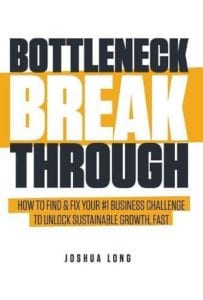
Bottleneck Breakthrough: How to Find & Fix Your #1 Business Challenge to Unlock Sustainable Growth, Fast
You said you’re a fixer and we alluded to your book, which is Bottleneck Breakthrough: How to Find & Fix Your #1 Business Challenge to Unlock Sustainable Growth, Fast. Tease us a little bit with what we can find out in that book that can help individuals in their problems with the bottlenecks they’re having.
I outline the book in a way that it could be consumed in two different paths. The first chapter introduces the concept of bottlenecks. If you focus on solving a bottleneck and go from one key bottleneck to the next how you can unlock sustainable growth, stuff that isn’t a flash in the pan and drops you back. This is the part of how companies grow and continue growing. As you go through that, you get to the end of the first chapter and give an outline of the most common bottlenecks. If you’ve got an acute one, jump to that section. There are six sections of the book that walks through the key leverage areas that I’ve founded businesses. If you don’t have an acute one that jumps out, march through the book. By the time you get to the last chapter or chapter thirteen, it gives you a framework for assessing and scoring, “Which of your problems are the best ones to solve now because we’ve got limited time, we’ve got limited money and we’ve got limited staff?”
The resource restriction is always what we need to balance. To me, it’s picking the solution to the problems you have that combines the quickest to be implemented, the least risky to be implemented and has the highest benefit, highest chance for upside in the company. This is the tough stuff. This is thinking through instead of reacting that so many business owners end up living in is a state of being a fireman with both hands full of fire extinguishers, walking around double fisting it all day but not fires. It’s making time to analyze, “What are we dealing with and how can we march through fixing the stuff?” The problem is that many entrepreneurs have ADD, they love the new shiny, they love something novel. I use the old proverb fisting from the head down, that at the end of the day, all of the problems in the business are the owners creating or allowing. Tackling that stuff can be painful to them but it doesn’t need to take a long time. Management’s a four-letter word for small business owners. They hate it but to me, that’s one of the greatest differentiators between companies that exist and companies that thrive and dominate. The owner develops the management chops and values the role of management.
People are sometimes either tactical or are not. To get them more strategic, sometimes you have to determine what your strengths are. I’m curious about your background. I’m curious because we talked about how you worked with Chet Holmes, Tony Robbins, Mitch Russo and that whole group that you knew and have worked with. What did you do? What does your background that led to your interest in helping others at this point?
[bctt tweet=”In the world we live in, there is no way for anybody to have all the answers themselves.” username=””]I was getting my MBA while I was waiting to get into med school and I thought I wanted to be an orthopedic surgeon. I realized while I was getting my MBA, I loved business too. On the advice of a friend’s dad who was a retired neurosurgeon, he said, “You’re going to enjoy business more than medicine with where medicine is going.” I dove headlong after my MBA into entrepreneurship and had a mortgage brokerage and realized quickly how little I knew on how to run a small business, even having an MBA. Lo and behold, a buddy of mine gives me a CD about a guy named Dan Kennedy. I ate it up and realized how little I knew about marketing and direct response and went down that rabbit hole. I went deep with him and even bought into one of his little franchises, be an independent business adviser and learned a lot about copywriting.
The thing I appreciate about Dan was he was fiercely practical about cash-flow for small businesses. Being able to take some of his philosophy of, “Don’t do brand advertising because you think you need to get your name out there. You need to do ads where you pay for the ad on Monday, it runs Wednesday. You get sales Thursday. You deposit the sales revenue by Friday before the check clears for the ad to run on Monday.” Every business owner knows, like that robbing Peter to pay Paul situation that you’re in out of the gate or at different points. After that, I got to file bankruptcy with the recession and got to go through that experience and mortgage brokerage.
Before it crashed, I was out before that thankfully.
I was one of the first of people I knew because mortgages were the first to fall and it was the domino effect everywhere else. I reached out to Chet. I liked his book, The Ultimate Sales Machine, and he brought me on. After a few months, they made me the marketing director and I was there for two years and worked closely with Mitch and Chet. I never got to work with Tony, but he was always involved in stuff in the company. Since then, that was 2008, I had a knack for connecting with these guys that had massive personalities and massive talent that I could I could hang with them. I was Chet’s go-to. I was his strategy guy for all of our clients even though I was younger than everybody by many years. I realized, “I have a unique ability here in connecting the dots for businesses,” and then I’ve been out on my own since 2010. Perry Marshall and I are good friends. We’ve got a couple of projects. We’ve got an equity client we’re working on together to help to grow to get acquired. I’ve been for whatever reason fortunate to work closely with all these guys and learn a lot and help them a lot and bring a lot of value.

Bottleneck: One of the greatest differentiators between companies that just exist and companies that thrive and dominate is the owner values the role of management well.
You do some amazing things and a lot of people would probably like to know how they could find out more about contacting you either as a coach/consultant or coachsultant or get your book. Is there some website you’d like to share?
It’s the same as the book title, BottleneckBreakthrough.com. If you get the book, you can go get all sorts of great resources for free on the back side of that. I am not a big social media guy. I post on Instagram little inspirational ideas or thoughts I have. Facebook gets pretty much the same post as Instagram. I’m on LinkedIn, I’ve got content there. You can go listen to other podcasts I’ve been on and connect with me there. I’m pretty easy to get ahold of if you want to have a conversation about your business. The biggest point for business owners that I find where I work best with is that they’re open. They’re realizing they don’t have all the answers and that’s a good place to be, not for my consulting work but in the world we live in. There is no way for anybody to have all the answers themselves. That admission of realizing you need help and that opens you up to be a better delegator and opens you up to be a better organizational leader. That’s the path that I wish I could encourage many business owners to go down is that self-awareness that, “I am not God. I cannot control this little fiefdom I’ve created. I need to divide and conquer.”
It was nice having you on the show, Josh.
Thanks, Diane.
You’re welcome.
—
I want to thank Randy and Josh for being my guest. What great guests we get on the show. If you’ve missed any past episodes, they’re great to catch up on. I hope you join us for the next episode of Take The Lead Radio.
Important Links:
- Randy Gage
- Mad Genius
- Risky Is The New Safe
- Tom Hopkins – previous episode
- Amway Corporation
- As A Man Thinketh
- Why You’re Dumb, Sick and Broke… And How to Get Smart, Healthy and Rich!
- Randy Gage on YouTube channel
- Power Prosperity Podcast
- Think And Grow Rich
- RandyGage.com
- Randy Gage on Facebook
- Randy Gage on Twitter
- Josh Long
- Bottleneck Breakthrough Group
- Mitch Russo – previous episode
- Perry Marshall – previous episode
- Innermetrix
- Myers-Briggs
- Kolbe
- Bottleneck Breakthrough: How to Find & Fix Your #1 Business Challenge to Unlock Sustainable Growth, Fast
- The Ultimate Sales Machine
- BottleneckBreakthrough.com
- Josh Long on Instagram
- Josh Long on Facebook
- Josh Long on LinkedIn
About Randy Gage
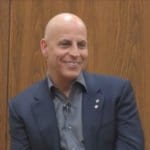
Randy Gage is a thought-provoking critical thinker who will make you approach your business — and your life — in a whole new way. Randy is the author of ten books translated into 25 languages, including the New York Times bestsellers, “Risky Is the New Safe” and “Mad Genius.” He has spoken to more than 2 million people across more than 50 countries, and is a member of the Speakers Hall of Fame. When he is not prowling the podium or locked in his lonely writer’s garret, you’ll probably find him playing 3rd base for a softball team somewhere.
About Joshua Long
 Joshua Long is a coach/consultant or as he calls it a coachsultant with Bottleneck Breakthrough Group. He helps B2B business owners find the single biggest challenge stopping their business from growing, and then help fix it within 90 days. He is the author of Bottleneck Breakthrough: How to Find & Fix Your #1 Business Challenge to Unlock Sustainable Growth, Fast.
Joshua Long is a coach/consultant or as he calls it a coachsultant with Bottleneck Breakthrough Group. He helps B2B business owners find the single biggest challenge stopping their business from growing, and then help fix it within 90 days. He is the author of Bottleneck Breakthrough: How to Find & Fix Your #1 Business Challenge to Unlock Sustainable Growth, Fast.
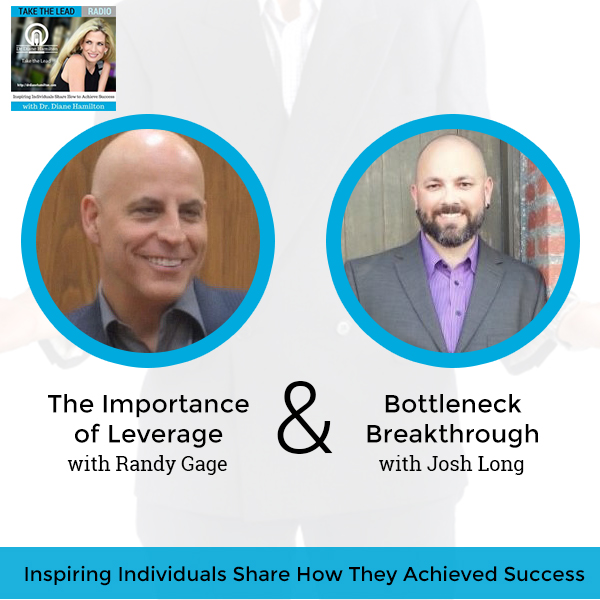

0 Comments